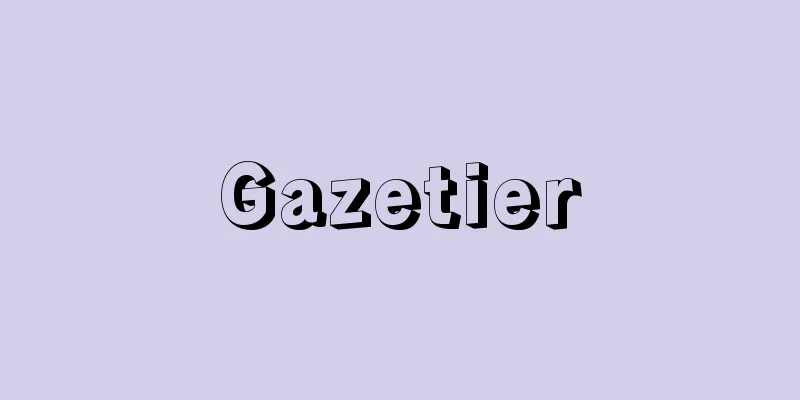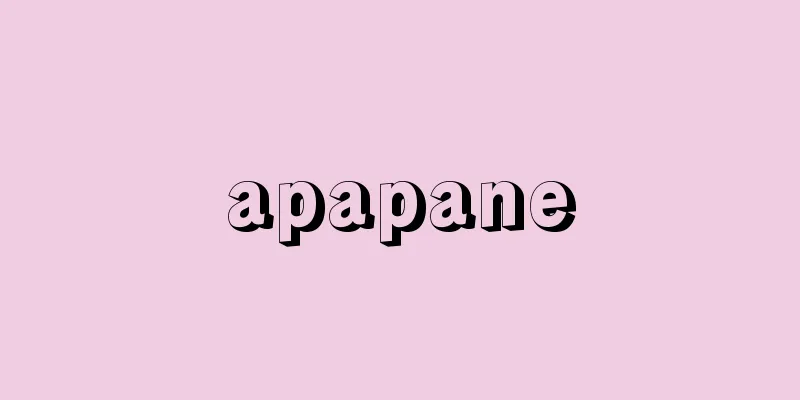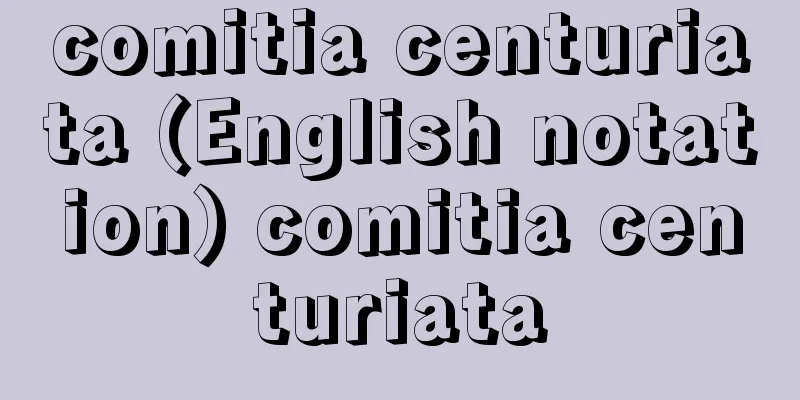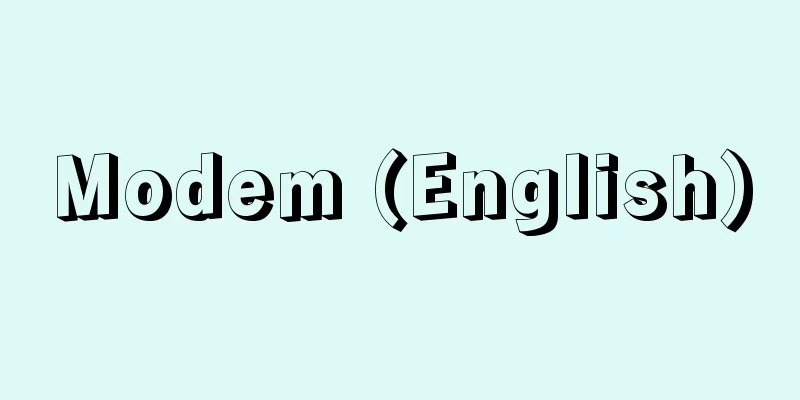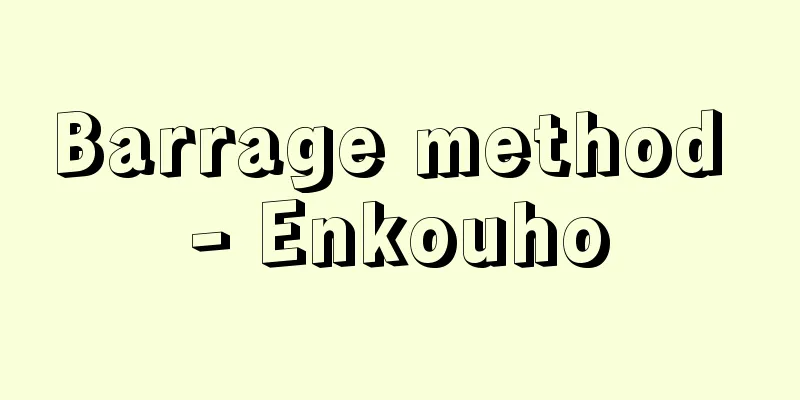German - Which one?
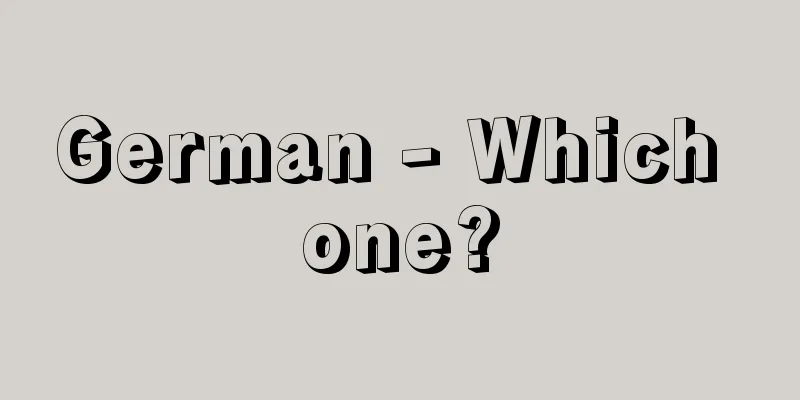
|
Like English, it is a language that belongs to the West Germanic branch of the Indo-European language family, the Germanic language branch (however, this trichotomy that divides the Germanic languages into North Germanic, East Germanic and West Germanic is not necessarily the accepted theory today, as some scholars hold different views, and it is subject to revision as research progresses in various fields, including linguistics). The foreign language closest to German is Dutch, followed by English. The spellings that German has that English does not have are the four vowels ä, ö, ü, and äu, and the consonant ß (pronounced "es-zett"). ß was originally a ligation of s and z, and is pronounced the same as ss. It is never placed at the beginning of a word, and alternates with ss depending on the spellings before and after it (for example, the infinitive of "forget" is verge ss en, while the past tense is verga ß ). [Yoshie Hamakawa] History of the German LanguageThe first known instance of the German word Deutsch, which translates to "German", was in 786 in a Latin document in the form of theodiscus. This was the Latin form of the adjective diutisc, derived from the German word diet, which meant "the people", and meant "the language of the people" in contrast to Latin, which was the official language of the upper classes and intellectuals at the time. However, of course, the German language never existed as a unified language from the beginning, and it was only at the end of the 18th century that the dialects of the Germanic tribes went through a long and complex process of assimilation and finally established themselves as standard German. Germany has always been a decentralized country rather than a centralized one, and various dialects are still alive and well today. The word Hochdeutsch, which means "High German", is also used today to mean "standard German", because the current standard German language was established based on the dialects of High Germany (i.e., southern Germany). The division of German into periods, like all other period divisions, has been the subject of much debate, but the four periods supported by a relatively large number of scholars today are Althochdeutsch (Old High German), Mittelhochdeutsch (Middle High German), Frühneuhochdeutsch (Early New High German), and Neuhochdeutsch (New High German), which are said to cover the years roughly from 750 to 1050, 1050 to 1350, 1350 to 1650, and 1650 to the present day, respectively. However, these period divisions are inevitably rough, and neither Old High German nor Middle High German is "standard German" as we understand it today. Just as the First Consonant Shift gave Germanic languages morphological characteristics that distinguished them from other Indo-European languages, the Second Consonant Shift (sometimes called the High German Consonant Shift) gave Southern German a distinctive appearance that differed from other Germanic languages and, therefore, from Northern German (the so-called "Low German," Niederdeutsch or Plattdeutsch). As mentioned above, the "High German" that was born in this way became the basis of standard German, whereas "Low German" has not yet been established as a written language, despite the existence of Low German writers such as Fritz Reuter (1810-74). The establishment of standard German was made possible by the efforts of Luther's translation of the Bible, the development and spread of printing, Goethe and many other writers and authors, as well as grammarians. We also cannot forget the contributions of Konrad Duden (1829-1911) in standardizing spelling, and Wilhelm Viëtor (1850-1918) and Theodor Siebs (1862-1941) in establishing standard pronunciation. In the history of German language change over the last 1200 years, the most noticeable thing is the simplification and weakening of vowels. For example, in the case of nouns and adjectives and in the conjugation of verbs, old German boasted a much wider variety of vowels than modern German. This trend is also exacerbated by the fact that strong (irregular) verbs can change to weak (regular) verbs, but the reverse is almost never the case, and the use of the subjunctive mood is becoming narrower as time goes on. [Yoshie Hamakawa] Regional differences in German dialects and everyday languageGerman as a written language has established standards for grammar, spelling, and pronunciation that are used throughout the German-speaking region. However, in the spoken language used in daily life, not only are dialects widely used, but even in pronunciation, despite the existence of a standard pronunciation, in many cases, a strong accent is widely used to the extent that it is possible to immediately tell where a person is from. If you start to subdivide these dialects, there is no end to it, and in extreme cases, even neighboring villages may have different dialects. Broadly speaking, however, German dialects are divided into "Low German" in the north and "High German" in the south (Dutch is today considered an independent national language, but is a branch of Low German). Those who have only learned standard German through school grammar find it difficult to imagine the significant differences between the various German dialects, but it is often said that "if a North German and a South German spoke in their respective dialects, they would not be able to understand what the other was saying without an interpreter" and this is no exaggeration. In addition to these dialectal differences, German words used in everyday language can vary from region to region. For example, "butcher" is called Schlachter in the north, Fleischer in the central and eastern part of the country, Metzger in the south, and Fleischhacker or Fleischhauer in Austria. "Carnival" is called Karneval in Cologne and Mainz in the Rhine region, but Fasching is the more common word in the south, including Munich. "Tie" is usually called Krawatte, but Schlips is more commonly used in the north and central part of the country. "Horse" is called Pferd in standard German, but it is called Gaul in central Germany and Roß in the south, including Austria. "Saturday" is called both Sonnabend and Samstag in standard German, but the former is used in everyday language in areas north of Düsseldorf and the latter mainly in the south. Knabe, meaning "boy", has already become an elegant word, except in a few compound words such as Wiener Sängerknaben (Vienna Boys' Choir), and is usually called Junge in the north and central parts of the country, Bub in the south, etc. [Yoshie Hamakawa] German word-making skillsGerman is a language with a rich ability to create new words. For example, all infinitives can be made into neuter nouns by capitalizing the first letter, so that, at least in theory, there are as many neuter nouns with the same spelling as there are infinitives. In fact, the number can increase even further, since infinitives with circumstantial words, as well as objects, can be made into neuter nouns as a whole. There is also the phenomenon of nounization of adjectives. All adjectives, including present and past participles that can be used as adjectives, can be made into nouns by capitalizing the first letter - and thus nouns of all three genders - so that the number of nouns that can be created in this way is very large. Also, although the number of so-called compound verbs with prepositions that are usually included in dictionaries is very limited, the number of combinations of prepositions and verbs that are theoretically possible is almost infinite. For this reason, there is a high probability that when reading or listening to German you will come across a word that does not appear in the dictionary. In such cases, you can break the word down into known elements and then recompose them. [Yoshie Hamakawa] Distribution of Modern GermanThere are currently around 100 million native German speakers, mostly in the Federal Republic of Germany (74 million), Austria (7.55 million), and just over 4 million in the German-speaking parts of Switzerland (about two-thirds of the Swiss population). German is also an official language in Luxembourg and Liechtenstein, but the total number is less than 400,000 in both countries. In addition to the above, due to border changes and immigration, German-speaking groups exist in neighboring countries of Germany, Austria, and Switzerland, such as Belgium, France, Italy, the Czech Republic, and Slovakia, as well as in the former Soviet Union, Romania, Hungary, the United States, Canada, Brazil, Argentina, Paraguay, South Africa, Namibia, and Australia. Since Germany is the core of these broadly defined German-speaking regions, the German language used there is sometimes called "Binneendeutsch" (German German) and contrasted with German in Austria and Switzerland, and in fact, in Austria and Switzerland, it is not uncommon for words and expressions that are different from "Binneendeutsch" to be used intentionally in official documents. On the other hand, there are several small "Sprachinsel" (language isolates) of German around Trento and Verona in northern Italy, and the residents of these areas, who are the descendants of very ancient immigrants, still retain very old language habits that date back to Middle High German and even Gothic (a branch of East Germanic languages). By the way, the "German language of Germany" in the German-speaking region was also becoming quite different from each other due to the difference in social and economic systems when the two countries were divided into East and West. There were even fears that if this situation continued, German would split into "West German" and "East German". It is true that not only were the vocabulary in the political and economic fields quite different in the two Germanys, but the same words often had completely different meanings, and words that could not be used in the other Germany appeared one after another. In addition, the fact that English had a significant influence in the former West Germany and Russian in the former East Germany could not be ignored. However, the basic vocabulary and grammar of German in both Germanys were the same, and were fixed in many ways in the form of written language, and today, after German unification, it is hard to imagine that German would take completely different paths in the former East and West Germany. German, which lags behind English, French, Russian and Spanish as an international language in the political and economic spheres, still plays a major role in the cultural sphere: for example, one in ten books published worldwide is written in German, and translations of German books rank third in the world after those of English and French.Furthermore, the enthusiasm for German among foreigners, which had declined after the Second World War, has recovered dramatically in the past few decades, and it is said that currently more than 17 million people in over 60 foreign countries are studying German. [Yoshie Hamakawa] Some differences from EnglishAlthough they are languages of the same family and very closely related, English has undergone a history of what might be called "revolutionary" changes, losing one after another the gender of nouns, the inflectional endings of articles, nouns, demonstrative pronouns, and adjectival adjectives, and the personal endings of verbs, while German still retains these to a large extent. For example, all singular nouns belong to one of three genders, masculine, feminine, or neuter, and have four cases, from the first to the fourth. It is mainly based on this fact that English is often considered to be "an easy language to get into, but difficult to master," while German is the opposite. In addition, German nouns are still usually written with an initial capital letter. Therefore, it is immediately possible to tell that a word in a sentence is a noun. This custom did not exist in Middle High German, and it became common around the end of the 16th century. However, since Danish abolished this custom in 1948, it has become a unique feature of German among European languages (however, for several reasons, including the fact that it is particularly difficult to define nouns in German, this custom has always been a subject of controversy, and the power of those in favor of abolishing it is gradually growing). German also has fairly complex and strict rules regarding the position of words and phrases within a sentence (so-called word order). One of the distinctive features of German is that in subordinate clauses, the verb (finite verb) is placed at the end of the sentence. However, compared to English, German word order is generally quite free. For example, in English, (1) The hunter killed the bear. means “The hunter killed the bear,” and (2) The bear killed the hunter. means “The bear killed the hunter,” and these are the only possible meanings. However, even though the German sentence corresponding to (1) is “Der Jäger tötete den Bären.” and the German sentence corresponding to (2) is “Der Bär tötete den Jäger.”, there is absolutely no problem grammatically in switching the positions of the subject and object in these two sentences to “Den Bären tötete der Jäger.” and “Den Jäger tötete der Bär.”, although this may result in some difference in nuance in meaning. In this example, even if the word order is changed, the meaning basically remains the same and there is no risk of misunderstanding. This is because, unlike in English, the case of the subject and object are clearly indicated by inflectional endings. However, if the subject and object happen to be the same form, as is always the case with neuter, feminine, and plural nouns, there is a possibility that a sentence can be interpreted in two different ways. For example, the sentence "Das Kind tötete die Mutter." can be interpreted as "The child killed his mother," "The mother killed the child," or "The child and the mother killed him," and which interpretation is correct can only be determined by the context (including the tone of the words). The sentence "Wolf klopfte das Herz." may be mistranslated by a beginner as "The wolf beat his heart." The correct answer is, of course, "Mr. Wolf's heart was beating fast," and Wolf in this case is a person's name in the third case. The word Wolf cannot be used in the singular without an article to mean "wolf." Such sentences are possible because German word order is not so rigid. [Yoshie Hamakawa] "German Grammar" by Sagara Morimine (1979, Iwanami Zensho)" ▽ "An Introduction to German Grammar" by Hamakawa Yoshie (1978, Hakusuisha)" ▽ "Modern German" by Hamakawa Yoshie (1975, Hakusuisha)" ▽ "Twentieth Century German" by Hans Eggers, translated by Iwasaki Eijiro (1975, Hakusuisha)" Source: Shogakukan Encyclopedia Nipponica About Encyclopedia Nipponica Information | Legend |
|
英語と同じく、インド・ヨーロッパ語族、ゲルマン語派の西ゲルマン語系に属する言語(ただし、ゲルマン語派を北ゲルマン、東ゲルマンおよび西ゲルマンの三語派に分けるこの三分説は、今日かならずしも定説ではなく、異説を唱える学者もおり、言語学をはじめとする各分野の研究が進むにつれ、訂正される可能性がある)。 ドイツ語にもっとも近い外国語はオランダ語、ついで英語である。英語になくてドイツ語にあるつづり字は、ä、ö、ü、äuという四つの母音、それに子音字ß(字母としては「エス・ツェット」と読む)である。ßはもとsとzの合字で、発音はssと同じであるほか、語頭に置かれることはなく、また、前後のつづり字のいかんによってssと交替する(たとえば、「忘れる」は、不定詞はvergessenであるのに対し、過去基本形はvergaßである)。 [濱川祥枝] ドイツ語の歴史「ドイツ語」にあたるドイツ語の単語Deutschは、786年、あるラテン語の文献にtheodiscusという形で現れたのが、今日知られている最初の例であるが、これは、「民衆」を意味した当時のドイツ語dietから派生した形容詞diutiscのラテン語形であって、当時の上流階級や知識階級の公用語だったラテン語に対する「民衆の言語」の意味であった。ただし、むろん、ドイツ語という言語が統一的な言語として初めから存在したわけではけっしてなく、ゲルマン諸部族の方言が、長期にわたる複雑な同化の過程を経て、18世紀の終わりごろ、標準ドイツ語としてようやくいちおうの成立をみたのであって、ドイツが昔もいまも中央集権の国ではなく地方分権の国であることとも相まって、各種の方言はいまなお健在である。「高地ドイツ語」を意味するHochdeutschという単語は、今日では「標準ドイツ語」の意味にも用いられるが、これは、現在の標準ドイツ語が、高地ドイツ(つまりドイツ南部)の方言を基盤にして成立したことからきている。 ドイツ語の時代区分も、あらゆる時代区分の例に漏れず、さまざまの論議をよぶが、今日比較的多くの学者によって支持されているのは、Althochdeutsch(古高(ここう)ドイツ語)、Mittelhochdeutsch(中高(ちゅうこう)ドイツ語)、Frühneuhochdeutsch(初期新高(しんこう)ドイツ語)、Neuhochdeutsch(新高ドイツ語)という四つの時期の区分であり、それぞれ、ほぼ750~1050年、1050~1350年、1350~1650年、1650年~現代までのドイツ語とされる。この時代区分も大ざっぱなものであることは免れず、また、古高ドイツ語や中高ドイツ語はともに、今日われわれが理解するような意味での「標準ドイツ語」ではない。 かつて第一次子音推移によってゲルマン語がインド・ヨーロッパ語族の他の言語と区別される形態的特徴をもつに至ったのと同様、南部ドイツのドイツ語も第二次子音推移(高地ドイツ語子音推移とよばれることもある)を閲(けみ)することによって、他のゲルマン語、したがってまた北部ドイツのドイツ語(いわゆる「低地ドイツ語」NiederdeutschまたはPlattdeutsch)とも異なる様相を呈することになった。前述のとおり、このようにして生まれた「高地ドイツ語」が、標準ドイツ語の基盤となったのに反し、「低地ドイツ語」は、フリッツ・ロイターFritz Reuter(1810―74)のような低地ドイツ語作家の存在にもかかわらず、今日なお文章語としては確立されていない。 なお、標準ドイツ語の成立にあたっては、ルターの聖書翻訳や、印刷術の発達と普及、ゲーテをはじめとする幾多の文人・作家、さらには文法学者などの努力が大いに貢献した。また、つづり字の統一についてはドゥーデンKonrad Duden(1829―1911)の、標準発音の確立についてはフィーエトルWilhelm Viëtor(1850―1918)およびジープスTheodor Siebs(1862―1941)の功績を忘れるわけにはいかない。 ほぼ1200年にわたるドイツ語の変遷史のなかで、とくに目だつのは、母音の単純化と衰微である。たとえば、名詞・形容詞の格変化や動詞の活用においても、昔のドイツ語は、現代ドイツ語よりはるかに多彩な母音を誇っていた。強変化(不規則変化)動詞が弱変化(規則変化)動詞に転ずることはあってもその逆はほとんどないことや、時代が下るにつれて接続法の使用範囲が狭まりつつあることなども、この傾向に拍車をかけている。 [濱川祥枝] ドイツ語の方言と日常語の地域差文章語としてのドイツ語は、文法・つづり字および発音のそれぞれについて、ドイツ語地域全体に通用する標準がほぼできあがっている。けれども、日常生活で使用される口語においては、方言が幅をきかしているばかりではなく、発音にしても、標準発音の存在にもかかわらず、多くの場合、当人のおよその出身地がすぐさま聞き分けられる程度には、訛(なま)りのかかった発音が大手を振ってまかり通っているのが普通である。こうした方言は、細分し始めればそれこそきりがなく、極端な場合には隣村同士でさえ違うこともある。しかし大別すると、ドイツの方言は、北部の「低地ドイツ語」と南部の「高地ドイツ語」に分かれる(オランダ語は、今日では独立した独自の国語とされているが、系列からいえば低地ドイツ語の一分派である)。そして、いわゆる学校文法で標準ドイツ語だけを学んだ人には、このドイツ語各方言のあいだの著しい相異は想像しにくいが、よくいわれる、「北ドイツの人と南ドイツの人がそれぞれの方言で話をしたら、通訳なしではお互いに何をいっているかわからないだろう」というのは、けっして誇張ではない。 こうした方言差のほか、ドイツ語では、日常語で用いられる単語に、地域によって相違がみられることがある。たとえば、「肉屋」は、北部ではSchlachter、中東部ではFleischer、南部ではMetzger、オーストリアではFleischhackerないしFleischhauerという。「カーニバル」は、ライン地方のケルンやマインツではKarnevalであるが、ミュンヘンをはじめ南部ではFaschingが定着している。「ネクタイ」は普通Krawatteというが、北部および中部ではSchlipsを用いることが多い。「馬」を意味する標準ドイツ語はPferdであるが、中部ではGaul、オーストリアを含めた南部ではRoßという。「土曜日」は、標準ドイツ語ではSonnabendとSamstagがともに用いられるが、日常語としては、前者はデュッセルドルフ以北の地域で、後者はおもに南部で用いられる。「少年」を意味するKnabeは、Wiener Sängerknaben(ウィーン少年合唱団)のような少数の合成語の場合を除き、すでに雅語となっており、普通は、北部および中部ではJunge、南部ではBubという等々。 [濱川祥枝] ドイツ語の造語能力ドイツ語は造語能力の豊かな言語である。たとえば、不定詞はすべて、頭文字を大文字で書くことによって中性名詞化されうるから、少なくとも理論的には、不定詞と同じ数だけの同つづり中性名詞が存在する。いや、目的語はむろんのこと、状況語を伴った不定詞さえ、一語として中性名詞になりうるから、その数はまだまだ増加する。形容詞の名詞化という現象もある。形容詞として使用可能な現在分詞・過去分詞をも含め、すべての形容詞は、頭文字を大文字で書いて名詞にする――しかも三つの性すべての名詞をつくる――ことができるから、こうしてつくられうる名詞もたいへんな数に上る。また、前つづりのついたいわゆる複合動詞で辞書に普通収録されているものはごく限られているが、これまた、理論上可能な前つづりと動詞の組合せの数は、ほとんど無限といってよい。それだけに、ドイツ語を読んだり聞いたりしていて、辞書に出ていない単語に出会う可能性もまた大きいわけで、そういう場合には、その単語をいったん既知の要素に分解し、しかるのちそれらを再合成すればよい。 [濱川祥枝] 現代ドイツ語の分布ドイツ語を母国語とする人の数は、現在およそ1億人である。そのだいたいの内訳は、ドイツ連邦共和国に7400万人、オーストリアに755万人、スイスのドイツ語地域に400万人余り(これはスイスの総人口の約3分の2にあたる)、がおもなところで、ルクセンブルクおよびリヒテンシュタインでもドイツ語は公用語であるが、数のうえからいえば、両国をあわせて40万人足らずにすぎない。 以上のほか、国境の変更や移民の関係から、ベルギー、フランス、イタリア、チェコ、スロバキアなど、ドイツないしオーストリアやスイスの隣接諸国、あるいは、旧ソ連地域、ルーマニア、ハンガリー、アメリカ、カナダ、ブラジル、アルゼンチン、パラグアイ、南アフリカ、ナミビア、オーストラリアなどにもドイツ語グループが存在する。 これら広義のドイツ語圏のうち、ドイツがその中核になっているところから、この国で使用されるドイツ語を「ドイツ本国のドイツ語」Binnendeutschとよんで、とくにオーストリアおよびスイスのドイツ語と対置することがあり、事実、オーストリアとスイスでは、公的な文書においても、意識的に「本国のドイツ語」とは異なった単語や表現形式が用いられることも珍しくない。他方、北イタリアのトレントやベローナの周辺には、それぞれ小規模ながら、ドイツ語の「孤立言語圏」Sprachinselがいくつもあり、非常に古い時代の移民の子孫であるこれら地域の住民は、中高ドイツ語、さらにはゴート語(東ゲルマン語の一分派)にまでさかのぼる、たいへん古めかしい言語習慣をいまだに温存しているという。 ところで、ドイツ語圏であるドイツの「本国のドイツ語」も、東西に分かれていたころの社会・経済体制の相違から、お互いにかなり違ったものになってきつつあった。そして、このままの状態が続けば、ドイツ語は「西ドイツ語」と「東ドイツ語」に分裂してしまうのではないかという危惧(きぐ)が表明されることさえあった。確かに、政治や経済の領域の語彙(ごい)は両ドイツでかなり違っていたばかりではなく、同じ単語でもまるで意味の違うこともしばしばあったし、そのままでは他方のドイツで通用しない単語も次々に登場した。また、旧西ドイツでは英語の、旧東ドイツではロシア語の影響が著しいという事実も軽視はできなかった。しかし、両ドイツのドイツ語の基本語彙や文法の根幹は同一であり、また文章語という形で幾重にも固定されていたし、ドイツの統一を経た今日では、ドイツ語がかつての東西ドイツにおいてまったく別の道を歩むことになるとはまず考えられない。 なお、政治や経済の領域における国際通用語としては、英語、フランス語、ロシア語およびスペイン語の後塵(こうじん)を拝しているドイツ語も、こと文化の各領域ではいまなお大きな役割を果たしており、たとえば、世界中で出版される書籍の10冊に1冊はドイツ語で書かれているし、ドイツ書の翻訳も、英語およびフランス語の書籍の翻訳に次いで世界第三位を占めている。また、第二次世界大戦を挟んで低下していた外国人のドイツ語熱もここ数十年間とみに回復し、現在では、60余りの外国で1700万人以上の人々がドイツ語を習っているといわれる。 [濱川祥枝] 英語との違いのいくつか同じ語系の、しかも非常に近い関係にある言語とはいえ、英語がいわば「革新的」な変化の歴史をたどり、名詞の性、冠詞・名詞・指示代名詞・付加語的形容詞の屈折語尾、動詞の人称変化語尾などを次々に失っていったのに対し、ドイツ語は、これらのものをいまなおかなりの程度まで保持している。たとえば、すべての単数名詞は男性・女性または中性という三つの性のいずれかに属するほか、一格から四格まで、四つの格をもっている。英語が「入りやすいが窮めがたい言語」、ドイツ語はその反対とされることが多いのは、主としてこの事実に基づいている。 また、ドイツ語の名詞は、いまなお頭文字を大文字で書くのが普通である。したがって、文中の単語が名詞であることだけはただちに見分けることができる。この習慣は中高ドイツ語にはまだなく、一般化したのは16世紀末ごろであるが、1948年にデンマーク語がこの習慣を廃止して以来、ヨーロッパ諸言語のなかで、ドイツ語だけのユニークな特色となっている(ただし、ドイツ語では名詞の定義がとくにむつかしいことなどいくつかの理由で、この習慣はつねに論議の的になっており、廃止論者の勢力は漸次強まりつつある)。 文章内での単語や句の位置(いわゆる語順)については、ドイツ語にもかなり複雑かつ厳密な規定があり、副文(従属文)では動詞(定動詞)が文末に置かれることなど、ドイツ語の際だった特色の一つであるが、英語に比し、ドイツ語の語順は一般にかなり自由である。たとえば英語の場合、〔1〕The hunter killed the bear.は「その猟師はそのクマを殺した」、〔2〕The bear killed the hunter.は「そのクマはその猟師を殺した」の意味であり、かつ、この意味でしかありえないが、〔1〕にあたるドイツ文はDer Jäger tötete den Bären.、〔2〕にあたるそれはDer Bär tötete den Jäger.であるとはいえ、この二つの文章において主語と目的語の位置を入れ替えて、それぞれDen Bären tötete der Jäger.およびDen Jäger tötete der Bär.とすることは――意味のうえで多少ニュアンスの相違が生まれる可能性はあるものの――文法的にはまったく問題がない。この例文の場合、このように語順を変えても基本的には意味が変わらず、しかも誤解のおそれが生じないのは、英語と違い、主語および目的語の格が屈折語尾によって明示されているからにほかならないが、たまたま主格と目的格が同形の場合――しかも、中性・女性および複数名詞の場合にはつねにそうであるが――には、一つの文章が二様に解釈される可能性が生まれる。たとえば、Das Kind tötete die Mutter.という文章は、「その子供はその母親を殺した」とも、「その母親はその子供を殺した」ないし「その子供をその母親は殺した」とも解釈でき、そのいずれの解釈が正しいかは、(語勢をも含む)コンテクストによって判断するほかない。Wolf klopfte das Herz.という文章は、初心者には「オオカミが心臓をたたいた」と迷訳されかねない。正解はむろん「ウォルフさんは心臓がどきどきした」で、この場合のWolfは三格の人名である。Wolfという単語が、「オオカミ」という意味で無冠詞・単数の形で用いられることはありえない。こうした文章が可能なのも、ドイツ語の語順がそれほど固定されていないからである。 [濱川祥枝] 『相良守峯著『ドイツ文法』(1979・岩波全書)』▽『濱川祥枝著『ドイツ文法の初歩』(1978・白水社)』▽『濱川祥枝著『現代ドイツ語』(1975・白水社)』▽『ハンス・エガース著、岩崎英二郎訳『二十世紀のドイツ語』(1975・白水社)』 出典 小学館 日本大百科全書(ニッポニカ)日本大百科全書(ニッポニカ)について 情報 | 凡例 |
<<: German Theater (English: Deutsches Theater)
Recommend
Rhizophora mucronata (English spelling) Rhizophoramucronata
...The root is spindle-shaped and 15-40cm long. W...
Fuso - Fuso
[1] 〘Noun〙① A sacred tree whose leaves resemble th...
Hatari (English spelling) Hatari!
An American film made in 1961 and directed by Howa...
General Systems Theory
…In his large-scale work Theoretical Biology (193...
Gukki
…Hipparchus determined that the lengths were 365 ...
Cosa Nostra (English spelling)
...The Mafia establishes its authority through th...
Jacob Henry Schiff
1847‐1920 American banker. Born in Frankfurt am Ma...
Lepiota rhacodes (English spelling) Lepiotarhacodes
…[Rokuya Imaseki]. . … *Some of the terminology t...
askerı (English spelling) askeri
...In the case of non-Muslim ethnic groups, the r...
Zäsy, U. (English spelling) ZasyU
…German jurist. His German name was Ulrich Zäsy. ...
Teacher training
Education for training teachers for primary and se...
Traveling Sayings - Traveling Sugoroku
A humorous storybook. Written by Yamanote no Bakah...
Boisguillebert
…French economist. Sometimes written as Boisguill...
Prince Gong's death - Prince Gong's death
A member of the imperial family of the Qing Dynas...
API - API
Abbreviation for Application Programming Interfac...
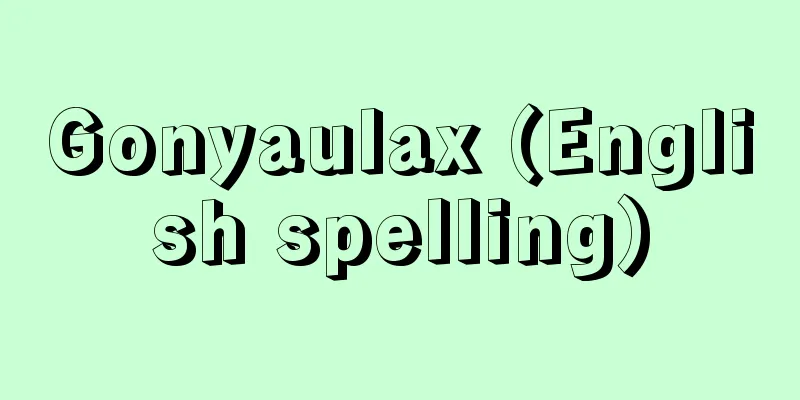
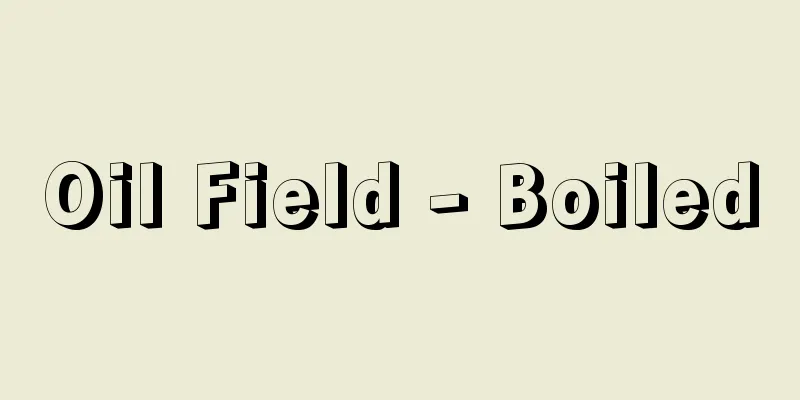
![Anambra [State] - Anambra](/upload/images/67cf331a91cd5.webp)
